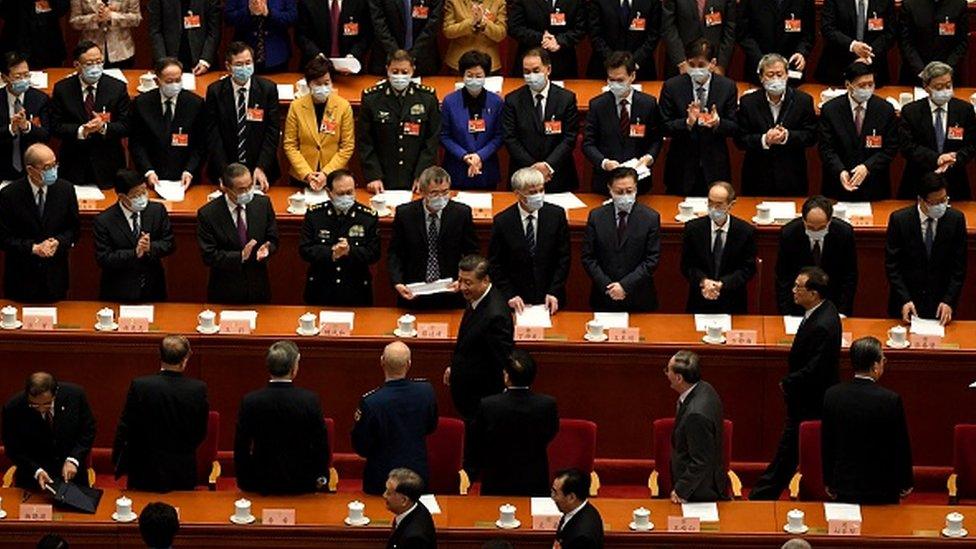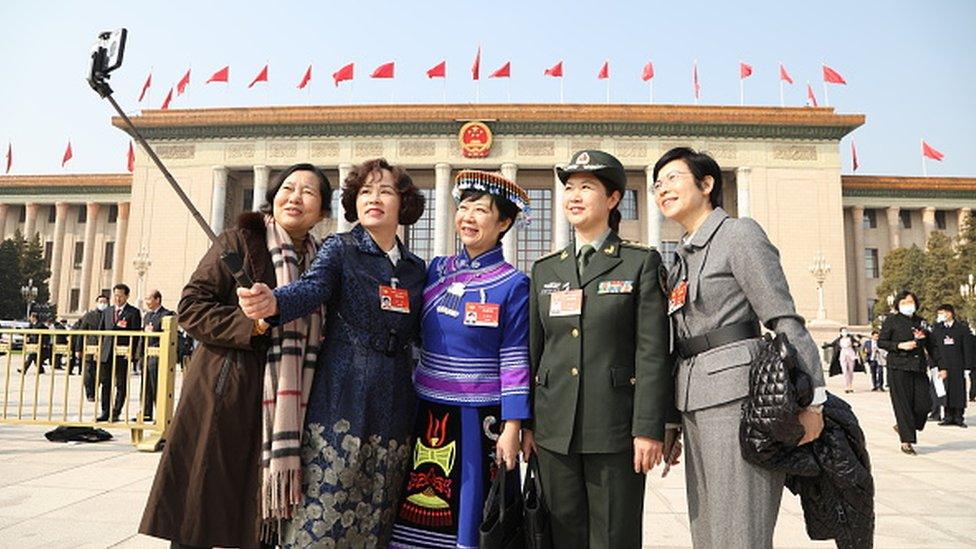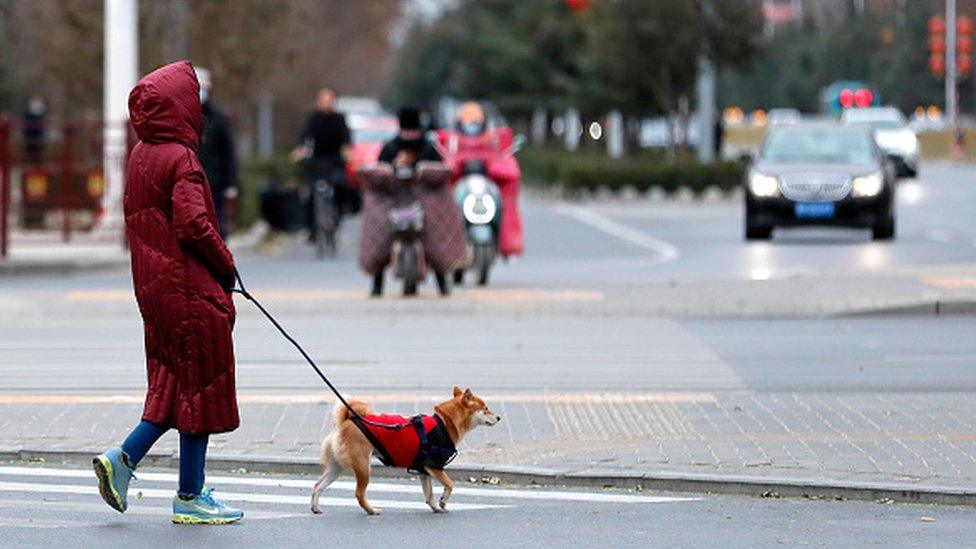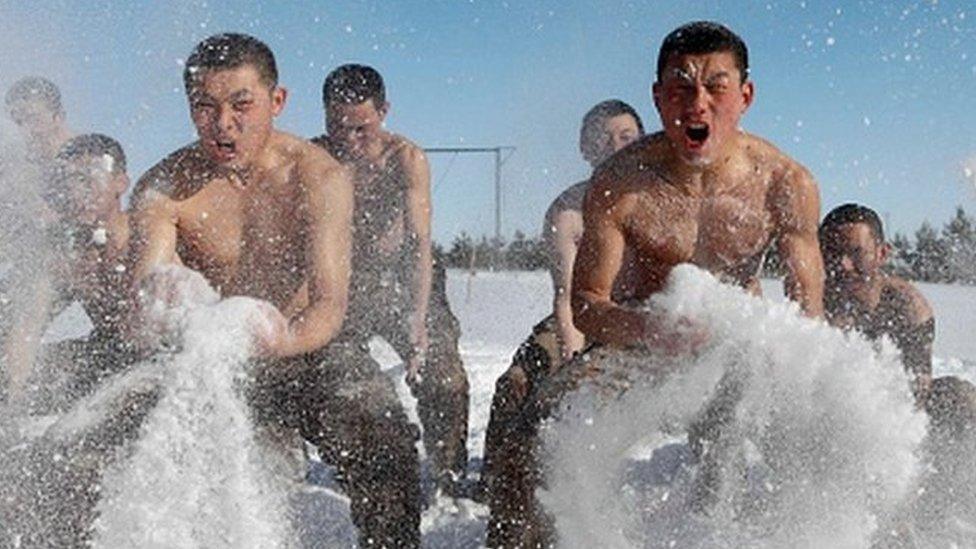Two Sessions: Gender roles, mental health discussed at China's top meet
- Published

Thousands meet in Beijing every year to advise the government on societal changes
At China's most important political conference this year, gender roles, mental health and even celebrities have dominated discussions.
Every year, delegates for the "two sessions" or lianghui, meet for over a week, and they put forward proposals for new social policies.
These range from the conventional to the downright quirky, but often ignite furious debate, and demonstrate some of the greater issues affecting people in China, and where support lies.
On Tuesday one of the sessions, the meeting for China's top advisory body, known as the CPPCC, drew to a close. During this year's event, policies that were put forward were especially framed around the specific roles of men and women, generating much discussion online.
There were also policies to alleviate the increased pressures of young people, proposed changes to the country's education system, and inevitably, in a post-Covid-19 era, policy suggestions focused on health.
Women 'forced back' into traditional roles
Thousands of proposals are submitted every year. But this year, much of the discussion online has focused on specific proposals concerning women.
Proposals suggesting the marriage age in China be dropped to 18 for both men and women, external, and that romance and marriage issues become part of the school curriculum have largely been met with anger by female netizens, who feel that the government is trying to encourage them into getting married and having children as soon as they leave school.

CPPCC members come from China's various walks of life and ethnic groups
Similarly there has been backlash online to proposals about extending the length of maternity leave, external and relaxing family planning policies, external.
Many feel that unmarried Chinese women are already unfairly discriminated against when applying for jobs, and that if such proposals became policy, they would force them back into traditional roles.
China's declining marriage and birth rate has been a major concern of the government in recent years. Many young Chinese women are increasingly seeking to further their careers, but being born under China's now-abolished one child policy means they now face being sole carers for two elderly relatives, as well as increased pressure to have children.
'Gender-differential' proposals

Ahead of the CPPCC, lawmakers called on schools introducing a "gender-differential" education
Proposals this year have also been contentious which are centred around a "gender-differential" education concerning boys.
There have been proposals on "improving the imbalance", external between male and female teachers in primary and secondary schools, given that the industry is largely female-dominated, to improve the presence of men in children's early education.
There has also been a proposal to increase the amount of sports classes at primary schools, external. While this proposal isn't gender specific, lawmakers have recently called on schools to push a "gender-differential education for students… to boost the masculinity of boys", external, and have suggested that boys are increasingly "timid and quiet" and in need of stronger guiding role models.
There has also been a lot of contention around a proposal to introduce a compulsory school course on what constitutes sexual assault, external.
While some are in support of the proposal, there are some who are of the view that the "girls protection" proposal appears to single out male children as potential perpetrators.
Some users have pointed out that where men are the victims of sexual assault, the existing laws are somewhat lax. Same-sex sexual assault between males was only made illegal in China in 2015.
Burden on young adults
Proposals centred around alleviating the increased pressures of young adults have, on the contrary, been met much more positively.
There has been a lot of online support for a proposal to grant single home-renters rental discounts, external, as well as one on stronger supervision over China's "996" work culture, external.

Chinese billionaire Jack Ma has been an advocate of China's controversial "996" culture
Working excessive overtime has become endemic in Chinese urban society, and working "996", i.e. from 9am to 9pm, six days a week, has become a way of life for many young Chinese.
There has also been significant support for proposals on boosting recognition of China's growing mental health problem. The official People's Daily says that more than 95 million suffer from depression in China - roughly 2.1% of the population - and there's support for a policy on strengthening mental health awareness in schools, external.
Separately, another delegate has proposed making depression and psychological counselling coverable by public health insurance, external, which has been received with widespread praise online.
Pet-owners and 'star chasers'

There is support for a system that penalises owners who don't look after their pets
The CPPCC also often highlights discussions about the more unusual proposals.
There has been much talk on Weibo about proposals to build animal cruelty in China's controversial social credit system, and introduce a blacklist for people who abandon their pets, external, amid a growing consciousness of animal welfare. Both have been met with praise.
Celebrities have also been a big talking point. There has been support for a policy suggesting that celebrities who have been involved in drugs-related scandals are "banned for life", external.
And there has been much discussion around a proposal to make celebrity fan clubs answerable to civil affairs departments on their activities, external, amid the rising appeal of celebrity culture.
One delegate argued that groups of "star chasers" have become popular, but have the potential to gather en masse, and so therefore should be recognised like any other social organisation, and must "carry out activities in accordance with the law, and undergo annual inspections".
- Published5 March 2021

- Published4 February 2021
